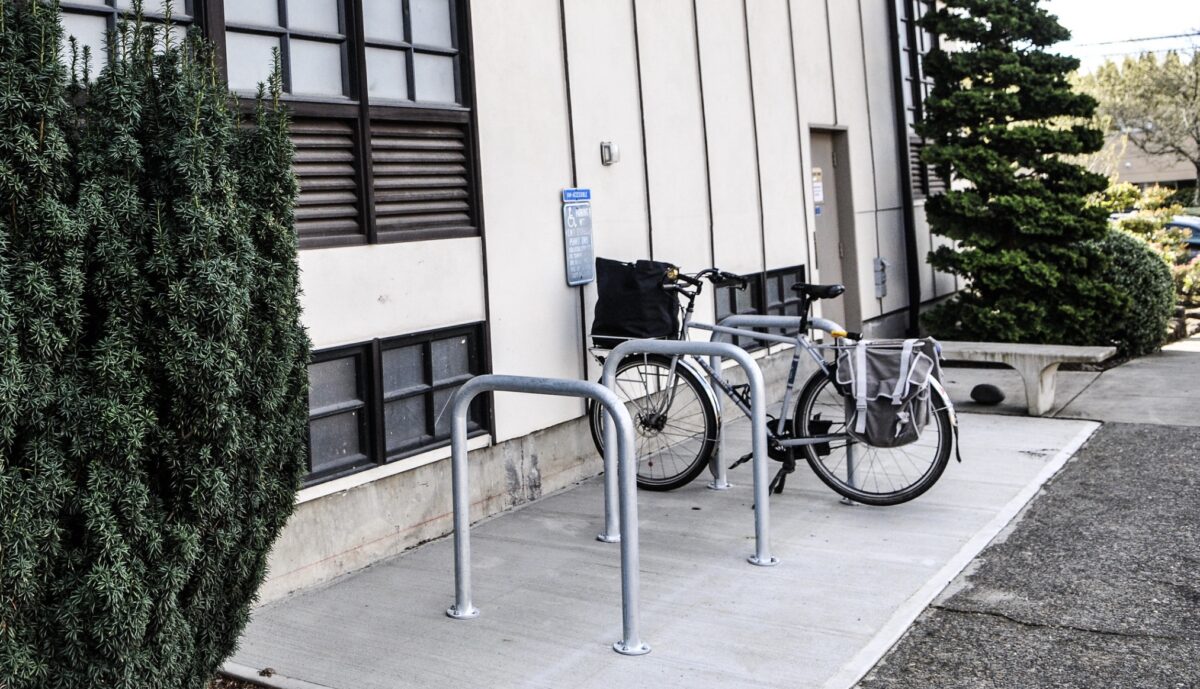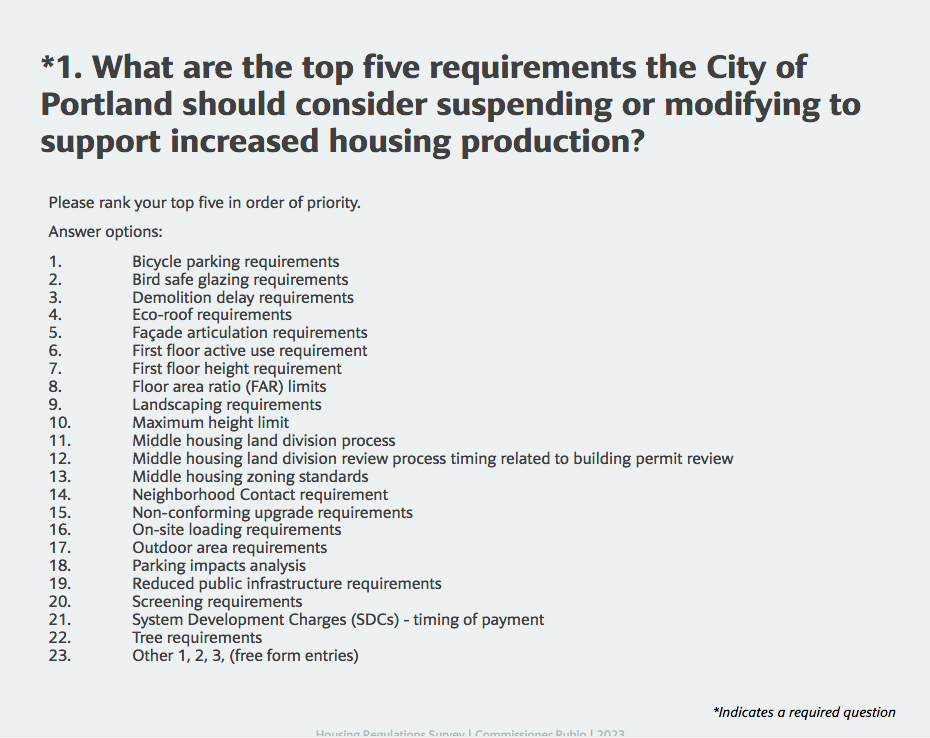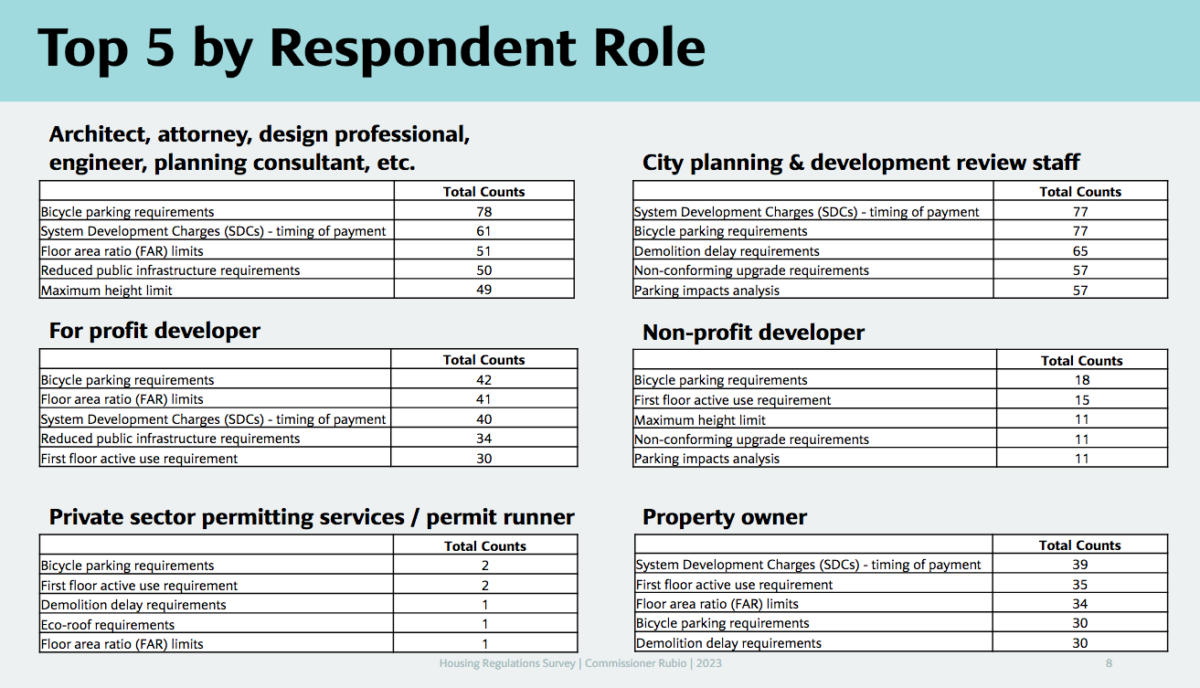 (Photo: Jonathan Maus/BikePortland)
(Photo: Jonathan Maus/BikePortland)
City leaders are turning over every possible rock to find policies that will help them build more housing more quickly. Last month, Portland City Commissioner Carmen Rubio and the Bureau of Development Services (BDS) sent out a survey asking which building requirements the City of Portland should consider suspending or modifying to help them reach that goal.
The results of that survey came out Wednesday and the thing at the top of developers’ list of peeves — rules about the type and quantity of bicycle parking required in new building projects — raised a lot of eyebrows in transportation circles.
The survey was emailed to 3,100 people involved in the building permit process: those who had applied for construction permits in the past four years; non-profit organizations developing new housing; businesses and professionals involved in housing development; and city employees from the seven bureaus who review permits.
Asked to rank the top five most burdensome regulations out of a list of 22, over a third of the the 600 respondents chose bike parking requirements as a top-five priority standing in the way of more quickly producing housing. It got more top-five votes than any other requirement, although System Development Charges beat bike parking as the absolute number one requirement needing attention. (A formatted presentation of survey results and next steps is available here.)
Portland passed a major update to its bike parking code in 2019, the first overhaul of requirements since 1996. The code upped the minimum quantity required, added theft prevention rules, addressed accessibility concerns, ended a loophole that allowed developers to put a hook inside a unit to fulfill the long-term parking requirement, and more.
Rubio is commissioner-in-charge of BDS and the Portland Housing Bureau, and she also heads Prosper Portland, the city’s economic development agency. With that portfolio, she sits at the crux of the housing affordability and supply crises that Portland and the state face.
And there is pressure coming from the state to do something. One of Governor Tina Kotek’s first actions in office was to declare a state of emergency because of homelessness and to sign an executive order creating the Governor’s Housing Production Advisory Council with the goal of building 36,000 homes per year.
Commissioner Rubio is well-placed to help meet those goals. Today’s survey is a first step in streamlining Portland’s processes and policies with an eye toward building more housing.
The slowness and complexity of Portland’s permitting system has been the subject of many reports and audits over the past several years. The 2021 report from the City Auditor, in particular, reads like a supporting document for replacing the commission form of government with a city manager:
The commission form of government and fragmented permitting authority across seven bureaus has resulted in no one entity empowered to resolve these long-standing Citywide problems. This is exacerbated by leadership turnover – both with bureau directors and Commissioner assignments – that results in changed priorities, focus areas, and funding decisions. As a result, each bureau director and their Commissioner-in-charge remains focused on their own bureau and not on the City permitting process as a whole.
“The next step is to do further research to see if any changes related to a specific process or policy would help to increase housing production.”
Given the governance inefficiencies pointed out by the audit, and the effect they have had on the permitting process, I reached out to Commissioner Rubio’s office to see if they had a sense of whether it was the actual regulations themselves that were slowing down housing production, or if the culprit might be the confusion caused by having permitting authority spread across seven different independent bureaus. Rubio’s Chief of staff Jillian Schoene responded. “Now that we have the initial feedback [from the survey], the next step is to do further research to see if any changes related to a specific process or policy would help to increase housing production,” she said.
Another source of confusion the 2021 audit details has been conflicts between new and existing regulations. The City Council stopped funding annual regulatory improvement reviews in 2017, and no reconciliation process has been in effect since.
Commissioner Rubio, says Schoene, in partnership with BDS and the Permit Task Force, has set up a Regulatory Workgroup tasked with “designing a new process for the city to follow for code development,” with the goal that for any new regulation “there is front-end vetting to learn early where conflicts may arise.”
The survey had a box for additional comments, and those make for bracing reading (even rivaling BikePortland comments). Several of them jumped out for different reasons, including number 26, in all caps:
PLEASE KEEP THE PUBLIC INFRASTRUCTURE REQUIREMENTS! THESE INVESTMENTS ARE IMPORTANT TO THE FUTURE OF OUR CITY AND PLANET BY MAKING MORE WALKABLE NEIGHBORHOODS.
Or this one:
You don’t need suspending or modifying [of requirements] to support increased housing production, you need to have staff return phone calls and email and speed up the processing part of the permit. I just had a townhouse project that took over a month just to intake. Pre-Covid this would have been completed in one day. And permits in pre-issuance for weeks is not acceptable. I typically have no problems with the regulations or fees. It’s the weeks of no response from staff.
This survey is a first step in the significant overhaul of the building permitting process which the city is undertaking. Other recent efforts have included the work of commissioners Dan Ryan and Mingus Mapps on the Permit Metric Dashboard, and also with the Permitting Improvement Task Force.
Much of Portland’s built environment relies on improvements to the public space made by, and required of, new development — things like new bike racks. BikePortland will be following this process as it unfolds.

Lisa Caballero has lived in SW Portland for over 20 years. She is on the Transportation Committee of her neighborhood association, the Southwest Hills Residential League (SWHRL) and can be reached at This email address is being protected from spambots. You need JavaScript enabled to view it..



